Russell T Davies reflects on The Sarah Jane Adventures, making children's TV, and working with Elisabeth Sladen
Russell T Davies returns to Bannerman Road in a new interview with SFX magazine
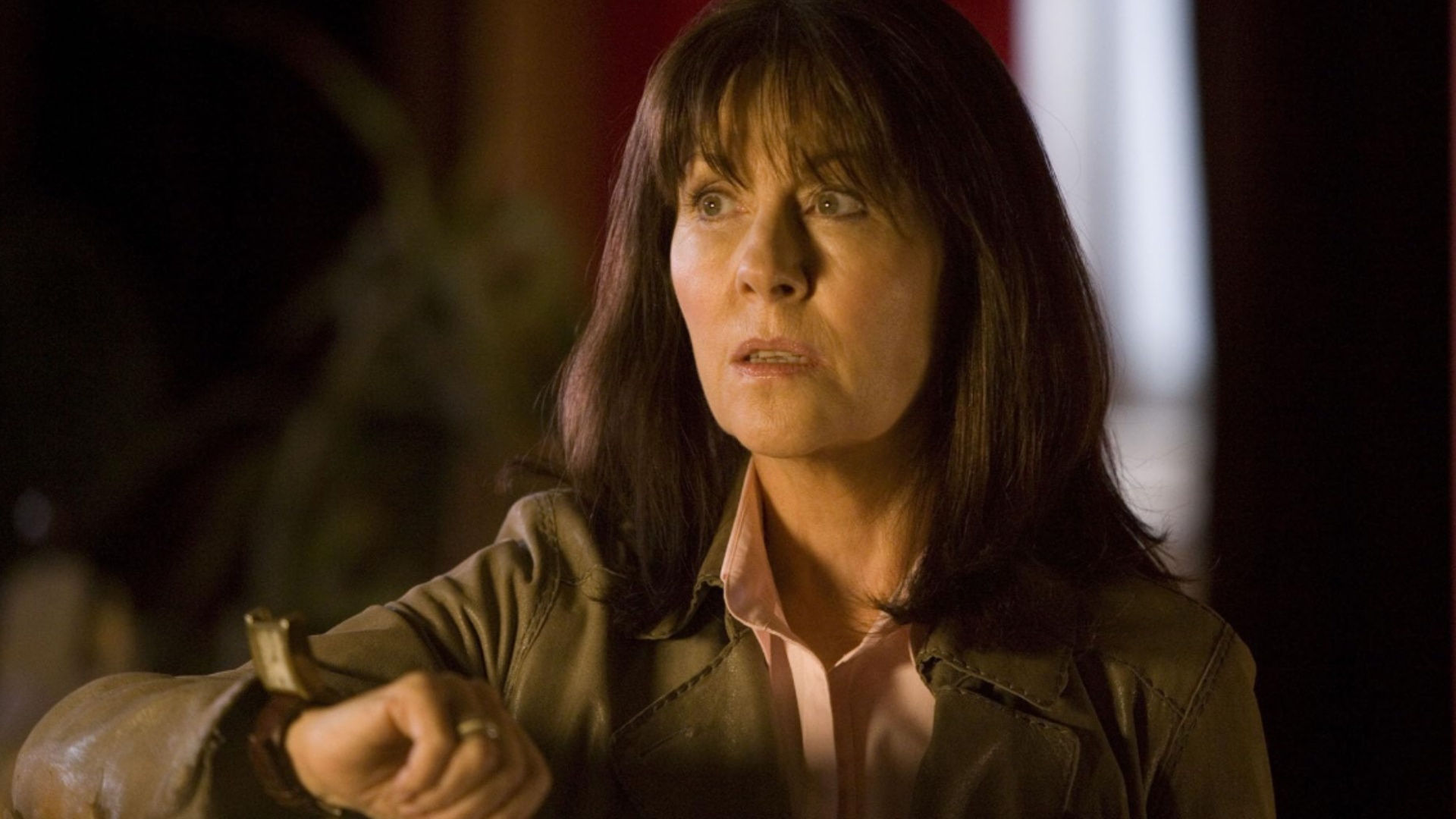
Want to feel old? Consider this: if The Sarah Jane Adventures were somehow personified as a human being (bear with us, this is a sci-fi mag), it would now legally be able to have sex, join the armed forces, drive a moped, and (best of all) purchase liqueur confectionery. Yes, terrifyingly, more than 16 years have passed since the spin-off show centred on Doctor Who’s most beloved companion debuted, on January 1, 2007. The brainchild of Russell T Davies (now once more ensconced in his throne as overlord of the Whoniverse), it’s still the apple of his eye.
The initial spark came on September 8, 2005, the day after Elisabeth Sladen shot her farewell scene for 'School Reunion', the Doctor Who episode which (31 years on from Sarah Jane Smith’s debut) saw her returning to the role alongside David Tennant’s Doctor. "I went to her hotel the next morning to say goodbye," Davies tells SFX magazine, "and her bedroom was full of gifts and cards and flowers. She said so many friends had been in touch. I thought, 'Oh, you can’t let this go. There’s no way we’re just doing one episode. That would be mad!'
"When we put the episode together, she walked away at the end, and I thought that was a beautiful ending," Davies continues, "But I also thought it was a bit sad. After all that emotional catharsis of life with the Doctor, she ends up with a tin dog [K-9] – that’s not much! So then I thought, 'Right, we’ll bring her back every year.' That was my original plan: every year, we’ll have a Sarah Jane adventure. Sarah Jane will call him to Earth saying, 'There’s something mysterious happening in this factory, let’s investigate.' And I thought then, 'We’ll give her a family – we’ll build her life.'"
Enter the BBC Children’s department, who had an idea of their own. "They said, 'We want to do Young Doctor Who – the Doctor on Gallifrey, having his first adventures," Davies recalls. "I was like, 'You’re not doing that in a million years. No chance! But if you want content, let’s think of a show for you.' So I thought, 'Right, we’ll do Sarah Jane and K-9,' and pitched that to them."

This feature first appeared in issue 364 of SFX magazine - Subscribe here to save on the cover price, get exclusive covers, and have it delivered to your door or device every month.
The final format teamed Sarah Jane with an adopted son, Luke (Tommy Knight) – a boy genius created by the alien Bane – plus a series of other kids: neighbors Maria (Yasmin Paige) and Rani (Anjli Mohindra), the wisecracking Clyde (Daniel Anthony), and finally 'Fleshkind' bioweapon Sky (Sinead Michael). With K-9 mostly unavailable, Mr Smith (Alexander Armstrong), a talking supercomputer in the attic of her house at 13 Bannerman Road, plugged the gap.
In her autobiography, Sladen wrote about having doubts over spending several months of the year in Cardiff, away from her family, when she was essentially retired. Davies recalls another cause for hesitancy. "She was worried about whether it was sticking your head too far above the parapet," he explains. "She loved fandom so much, she was worried some fans would think it’d look like she was replacing the Doctor in some way.
"She’d had a lifetime of knowing fans very well, going to conventions and being appreciative of the whole thing, and sometimes I think prolonged contact with fandom teaches you only to be modest. But sometimes you have to lift your head up and say, 'There’s a bigger horizon, you’ve got to look towards that.' So we had long talks about that. It’s one of those moments where the absolute love of fandom can hold you back. And there’s no way I was going to let that happen!"
Sign up to the SFX Newsletter
Get sneak previews, exclusive competitions and details of special events each month!
Davies co-wrote the pilot 'Invasion of the Bane' (with Gareth Roberts). And as executive producer, he was across every aspect of the series, writing notes on every script draft, watching every day’s rushes, checking every edit.
However, unlike Doctor Who, where Davies would routinely do a final pass on the script, rewrites were largely left to head writer Phil Ford (a veteran of the CG revival of Captain Scarlet), who from series 2 onwards was credited as co-producer. "It was much more writer-led by the original writers than Doctor Who," Davies says, explaining that SJA was "a simpler show" – and not as high profile. "With Doctor Who you’ve got to get every line as hard as a diamond, because you’re in a fierce marketplace." He’d still get involved on occasion, though. "Sometimes if they were big ones I’d have a go."
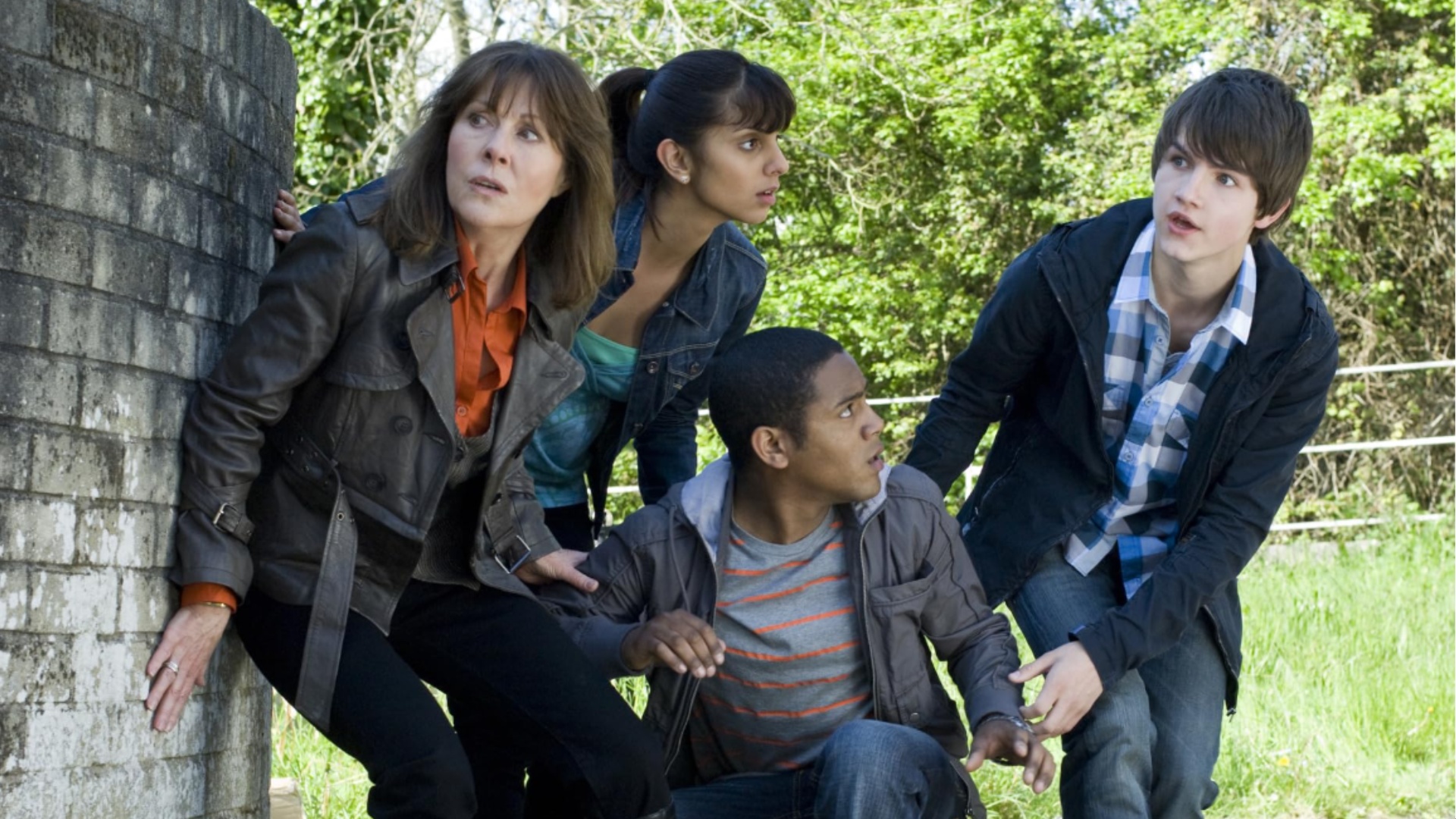
Having progressed to adult drama via Why Don’t You…? and CBBC dramas Dark Season and Century Falls, Davies had a good understanding of how to pitch things at the right level. "But that modulation of a voice is terribly simple," he says. "If you walk into a room and there’s a five-year-old there, you talk in a certain tone of voice."
That said, there were story ideas deemed inappropriate for SJA. "Matt Jones [writer of Who’s 'The Impossible Planet'] once pitched a Cyberman invasion of Bannerman Road, and I sat there thinking, 'What the Cybermen do is remove your brains and put them into metal – that’s horrible.'
"I don’t think Cybermen fit five o’clock in the afternoon. I don’t think Daleks do. We were always dying to get the Daleks in there, but if Sarah Jane and a bunch of kids could defeat a Dalek that makes the Daleks pretty soft!"
"You wanted great big villains, you wanted the end of the world," he continues, "but she’s not the Doctor, so you have to temper that by saying they’re brilliant, brave amateurs. That’s why in [alternate-timeline Who episode] 'Turn Left' you saw that Sarah Jane and the kids had tried to stop Florence the Plasmavore [from 'Smith And Jones'] and been killed.
"There was a natural youngness to it, but we were very keen that that wasn’t softness. There are obvious rules – no blood, no swearing. But within that it was absolutely the full emotional range." And Davies would cheerfully break any series-specific rules he’d laid down anyway. "I remember when I came in and wrote ‘Death Of The Doctor’, Phil Ford turned round and said, ‘But you told us no alien planets, and no killing the monsters.’ Which is exactly what I did on that!"
Life stories
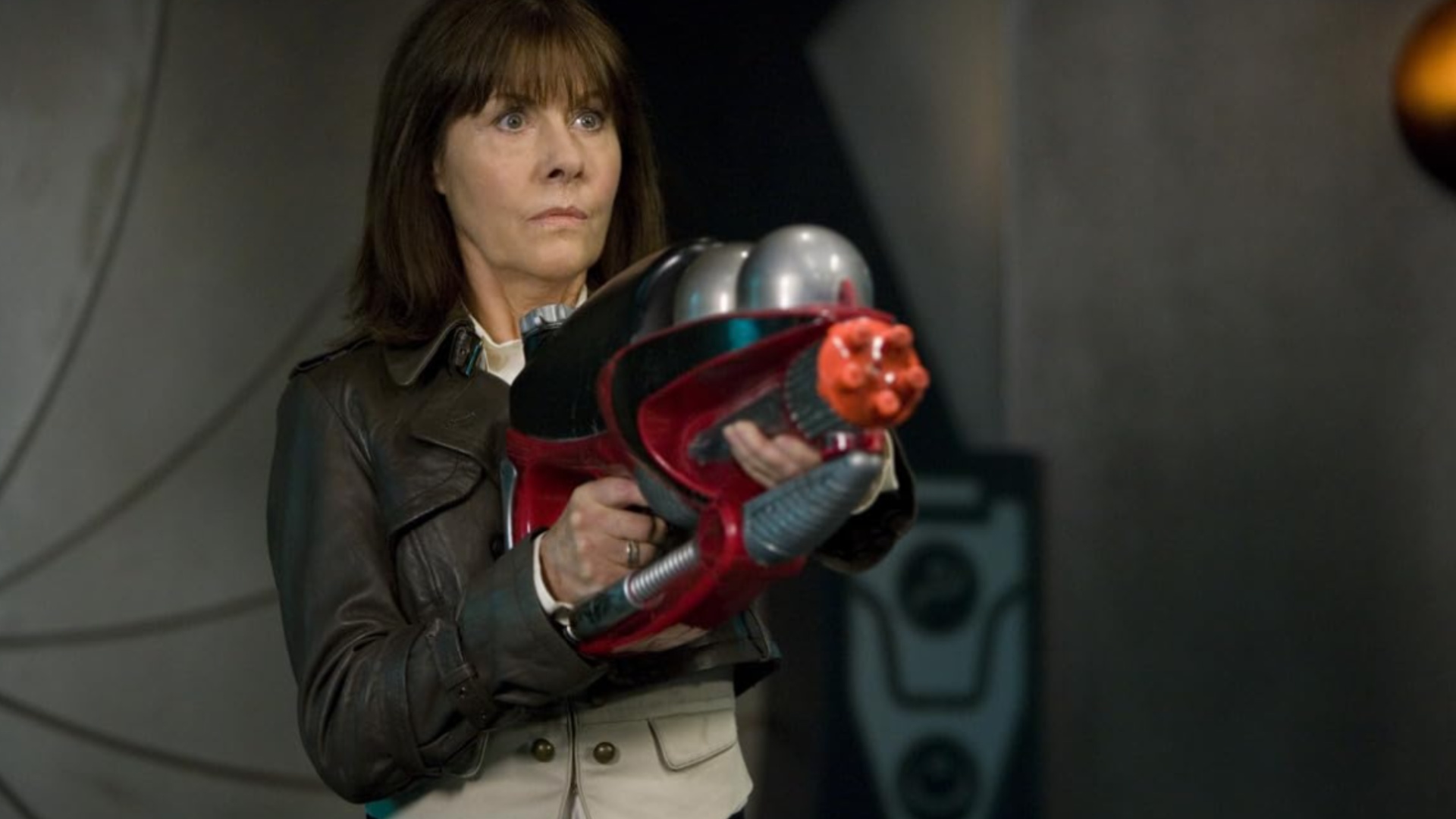
Prior to 'School Reunion', biographical data on Sarah Jane was pretty sparse. Freelance journalist, aunt called Lavinia, South Croydon… that was about it. Was fleshing out the character a key ambition? "Absolutely, to give her a full emotional life and a full history. We saw her as a baby. We saw her mum and dad. We saw what happened with Andrea Yates [a schoolfriend who died falling from a pier], because it changed the course of her life. I loved filling in all those gaps in her life. Not only that, but giving her a child, giving her responsibilities.
"And always keeping Sarah Jane’s spikiness as well," Davies adds. "You’d still have scenes where she’d be a bit frosty, because she was once very lonely and that could have left an echo inside her. I think by the end of that show she must have the most realized history of any Doctor Who companion – and I’m talking real television canon. We did it to her, and I love that! I’m so proud of it."
Not every plan they devised came off. One that fell through was bringing in Freema Agyeman’s Martha Jones for series two closer 'Enemy Of The Bane'. "She was going to be the companion who was in all the shows – she’d cross over into Torchwood, then The Sarah Jane Adventures. Then Chris Chibnall came along and offered her Law and Order UK, and you can’t argue with that," Davies laughs.
Martha’s loss was the Brigadier’s gain, with old soldier Nicholas Courtney hurriedly recalled to active duty for a reworked script. "Because of Nicholas Courtney’s age, he wasn’t in that story very much. Martha would have been sitting in that car with Sarah Jane, driving around solving crimes together."
Other familiar faces were David Tennant and Matt Smith as the Doctor, and Katy Manning as Jo Jones (née Grant). SJA also attracted impressive guest stars for a humble children’s show: Russ Abbot, Jane Asher, Samantha Bond, Nigel Havers, Suranne Jones, Phyllida Law, Eddie Marsan, Bradley Walsh… How did they manage it?
"When I came in and wrote 'Death Of The Doctor', I literally halved my fee, because sometimes you have to do that for children’s [television]," Davies says. "I think sometimes actors would do that too. They’d come and do it knowing they’d have a good time, and I suspect their fees weren’t as big as they’d normally be… And there’s always a little pot of money for a guest star somewhere."
Cash in the attic
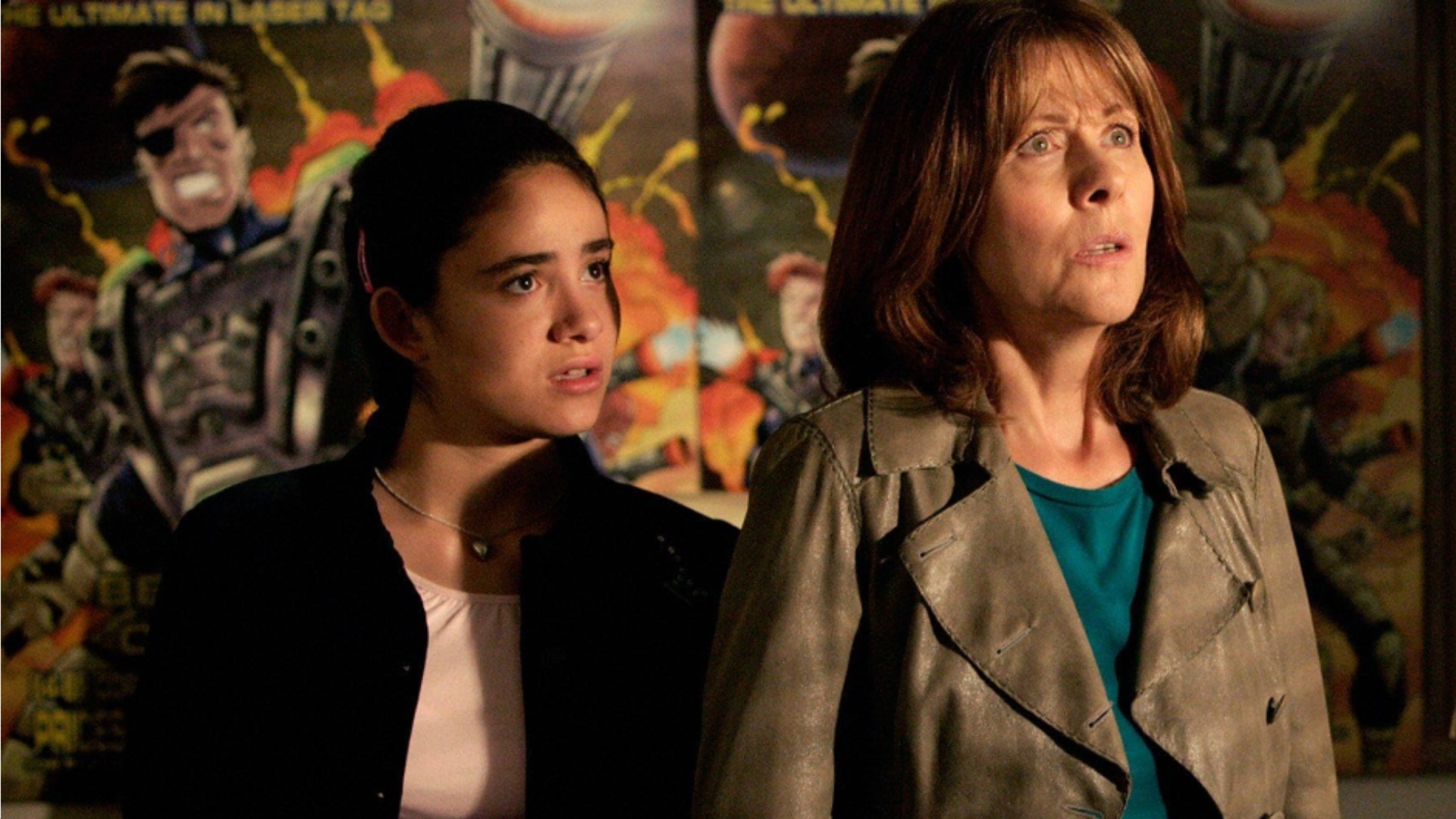
"It’s worth saying that now and again we had a bit of extra funding from BBC Drama," he continues. "Jane Tranter [Head of Fiction] loved The Sarah Jane Adventures – we could never have set it up without a boost of money from outside Children’s. BBC Drama gave us a lump sum to build the standing set of Sarah Jane’s attic, otherwise we could never have afforded it. My god, money is tight in children’s TV. That’s why we used a lot of Doctor Who monsters – we used the Sontarans when Doctor Who had just finished with them. Literally to save money."
Budgets got even tighter around 2008, after the financial crisis hit. With series 3, filming time for the series was reduced from 15 weeks to 12 weeks. "So one episode had to be shot in five days," Davies says. "That’s a lot for a 25-minute show." The opening teaser introduced in that series was one money-saving trick. "You know that little scene at the beginning, where Clyde says, '13 Bannerman Road is where Sarah Jane Smith lives…'? That was literally put in to expand the running time!"
How tight are we talking? Did they have to make say, five 25-minute SJA episodes for the cost of one 45-minute Doctor Who episode? "Not quite that. But more or less. It was very, very short of money. Every single year, Children’s was saying, 'We don’t know about this…' – and it was their number one show.
"But that’s how poor the BBC is. People don’t realize. It’s tremendously cash-strapped. And it was getting trickier and trickier. It’s nice to imagine that had we not lost Lis the show would have carried on forever, but I’m not sure it would have, because money was so tight by the end."
Which brings us to the sad subject of Elisabeth Sladen’s diagnosis of cancer, in February 2011. It speaks volumes that the first person she told, in a phone call on her way back from the doctors, was Davies. "I adored her," he says. "We had such a lovely relationship. It was beyond the working relationship. I wouldn’t see her that often, but we’d text every day.
"It also shows how diligent she was," Davies adds, concerning that call. "She was also phoning me as a matter of work. She was very much aware of an entire crew of people waiting for her. She imagined them being unemployed as a result of her illness. I know she carried that with her as a worry all the time."
With production on pause after the shooting of six stories for series 4 had run on into three additional ones for a fifth series, Sladen – a very private woman – was able to keep her illness out of the public eye. In the early hours of Tuesday, April 19, 2011, she passed away at Meadow House hospice in Southall. She was 65.
"I sent her a text on, I think, the last Sunday, but she didn’t reply because she was very ill by then," Davies recalls. "One of the things she said to her husband was, 'Tell Russell I’m sorry I didn’t reply to his text.'"
Davies takes a deep breath. "What a woman. She never quite told us how bad it was, bless her. That was absolutely private between her and her family, and I completely understand. I will never forget the shock of that day. We had no idea it was that bad, or that close.
"I had to go live on BBC News 24, and it was still hitting me – 'Oh my god, she’s dead'. They’d rushed me to some studio in LA, and I sat there thinking, 'Don’t cry on the news. Don’t upstage her, because then the story becomes about me'. Sitting there realizing that children would have to be told that their hero had died. Terrible situation, so sad."
The three stories in the can were broadcast in October as an abbreviated fifth series. Aborted storylines for the series’ second half included a first-draft script by Gareth Roberts and Clayton Hickman in which supercomputer Mr Smith took bowler-hatted, John Steed-esque human form. Rani and Clyde would have entered Narnia-like realm The Neverside via a newspaper offices’ lift in 'The Thirteenth Floor'; Phil Ford’s third-draft script was later reworked for Wizards vs Aliens, a CBBC show devised by Davies and Ford to keep the SJA crew in work.
The final story would have seen Sky revealed as the daughter of recurring Big Bad the Trickster. It might have also concluded with Rani and Clyde leaving (Mohindra and Anthony having decided to move on), perhaps as a couple – and possibly even the destruction of 13 Bannerman Road. But all this was up in the air.
Davies also had general plans to maintain the tradition of ratings-boosting crossovers. "Had The Sarah Jane Adventures continued I would have done that with every new Doctor – I’d have said, 'Please can we have Peter? Please can we have Jodie?'
"Ah," he gasps, transported by the thought, "Can you imagine Jodie Whittaker and Lis Sladen on-screen together? What a story that would have been! What a shame."
Golden years
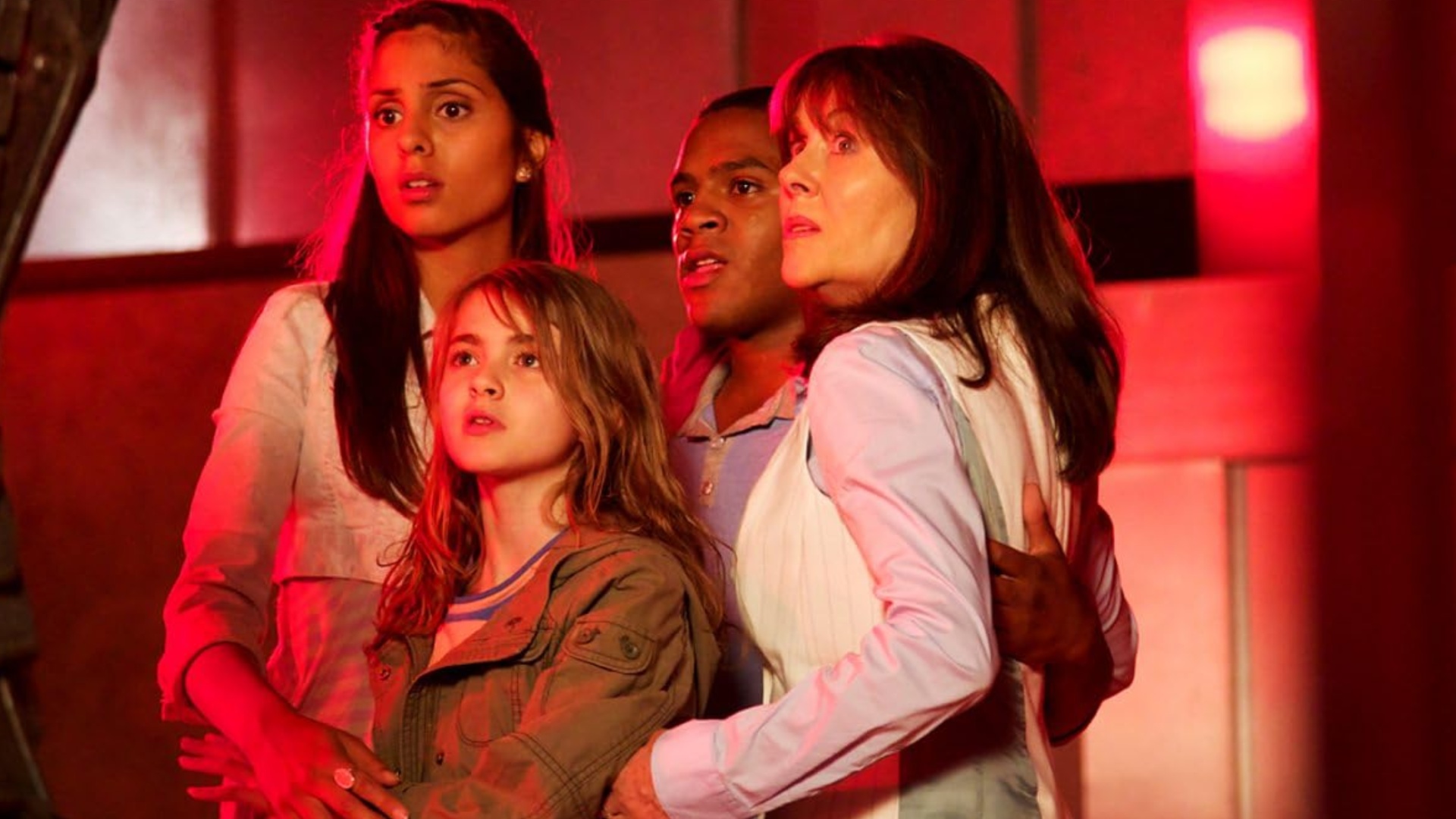
Looking back, 2007-2011 was a golden era for Doctor Who, with three different shows – Who, Torchwood and SJA – in production around the same time.
The MCU pinched the idea from the DWU, we suggest. "I think so!" Davies laughs. "About 2008 the squeeze on the BBC came along. Sometimes people think, 'Oh, Steven [Moffat] and Chris [Chibnall] didn’t keep that going' – you couldn’t, there’s not a penny to spare anymore. That’s why you need to supersize Doctor Who, like we’re doing now. We need money from outside because the BBC can’t afford to make anything."
With the Beeb now partnering with Disney on Who, speculation has naturally turned to potential spin-offs. As someone passionate about children’s TV, is a kids’ show a long-term ambition for Davies? "It’s an ideal, but we’re coming back to a world in which money in children’s is in even shorter supply," Davies says. "Even with all the goodwill in the world, we’d find it very hard to do now, unfortunately. There are fantasy shows – they do do stuff. But our stuff is expensive. You also have to keep the spin-offs looking as good as the main show, in order to maintain the entire brand – that’s part of the problem as well. So it’s genuinely tricky. There is no plan at the moment for children’s, and I’m sad about that, but just affording it would be hard.
"Hopefully!” he adds. "We’ll get there, give us time." Fingers crossed, because there are so many options. Nyssa And The Lazars? Perpugilliam Of The Brown: Warrior Princess? Mel’s Megabyte Modems? As SJA’s final caption put it, "The story goes on – forever"…
All five series of The Sarah Jane Adventures are not streaming on BBC iPlayer. For more, check out our picks of the best new TV shows coming our way.
Ian Berriman has been working for SFX – the world's leading sci-fi, fantasy and horror magazine – since March 2002. He's also a regular writer for Electronic Sound. Other publications he's contributed to include Total Film, When Saturday Comes, Retro Pop, Horrorville, and What DVD. A life-long Doctor Who fan, he's also a supporter of Hull City, and live-tweets along to BBC Four's Top Of The Pops repeats from his @TOTPFacts account.


